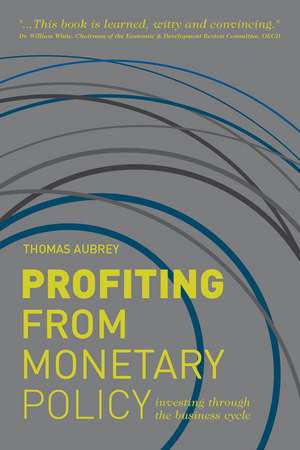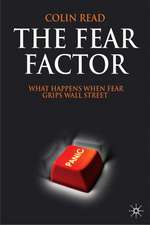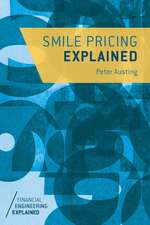Profiting from Monetary Policy: Investing Through the Business Cycle
Autor T. Aubreyen Limba Engleză Hardback – 23 noi 2012
Preț: 390.63 lei
Nou
Puncte Express: 586
Preț estimativ în valută:
74.76€ • 77.76$ • 61.72£
74.76€ • 77.76$ • 61.72£
Carte tipărită la comandă
Livrare economică 14-28 aprilie
Preluare comenzi: 021 569.72.76
Specificații
ISBN-13: 9781137289698
ISBN-10: 1137289694
Pagini: 215
Ilustrații: XII, 215 p.
Dimensiuni: 155 x 235 x 23 mm
Greutate: 0.48 kg
Ediția:2012
Editura: Palgrave Macmillan UK
Colecția Palgrave Macmillan
Locul publicării:London, United Kingdom
ISBN-10: 1137289694
Pagini: 215
Ilustrații: XII, 215 p.
Dimensiuni: 155 x 235 x 23 mm
Greutate: 0.48 kg
Ediția:2012
Editura: Palgrave Macmillan UK
Colecția Palgrave Macmillan
Locul publicării:London, United Kingdom
Cuprins
Introduction The Great Moderation and the Unravelling of a Great Myth From Model Failures to Streams of Data The Problem of Credit The Vienna and Stockholm Schools: A Dynamic Disequilibrium Approach The Neo-Wicksellian Framework Testing Wicksellianism The Creation and Destruction of Capital Where are the Customer's Yachts? Post Script - Constructing Business Cycle Tracking Funds Endnotes Bibliography
Recenzii
"A fascinating new book" - John M. Mason, Seeking Alpha
"Thomas Aubrey, a credit analyst, argues that investors have been led astray by the belief that economic growth drives asset-market returns . . . instead, investors should focus on the credit cycle." - The Economist
"Can modern-day Austrians use advanced financial techniques to more accurately predict a crash? U.K. financial consultant Thomas Aubrey has devised a method in his great new book . . . Aubrey focuses on the credit cycle as a way of determining whether to be bullish or bearish . . . It appears to be the first book-length effort to apply Austrian/Swedish finance theory." - Mark Skousen, Markskousen.com
"This book is learned, witty and convincing. Mr Aubrey draws adroitly from historical data and the history of economic thought to discredit much of 'modern' macroeconomic thinking. Rather, he supports a 'Neo-Wicksellian' view that puts credit and leverage at the heart of serious economic downturns. His practical guidance to asset managers, hoping to profit from identifying emerging disequilibria, is an added bonus." - Dr. William White, Chairman of the Economic and Development Review Committee, OECD and former Economic Advisor for the Bank for International Settlements
"Thomas Aubrey has done an impossible thing. He has used good but somewhat forgotten theory to the practical purpose of telling people who may wish to invest how to avoid the pitfalls of boom and bust. Hisbook is readable and useful and he argues his case convincingly. Read him and you may learn more than just good economics." - Professor Meghnad Desai, London School of Economics and Political Science
"The ideas of Knut Wicksell - Sweden's most famous economist - have come to play a central part in modern economists' understanding of the business cycle. In Profiting from Monetary Policy Thomas Aubrey performs the much-needed service of bringing those same ideas to the attention of investors, so as to better enable them to anticipate, withstand, and even profit from, financial booms and busts." - George Selgin, Professor of Economics, University of Georgia and Senior Fellow, The Cato Institute.
"A useful post-crisis read which uses economic theory to explain boom and bust." - Stephanie Hawthorne, Pensions World
"Thomas Aubrey, a credit analyst, argues that investors have been led astray by the belief that economic growth drives asset-market returns . . . instead, investors should focus on the credit cycle." - The Economist
"Can modern-day Austrians use advanced financial techniques to more accurately predict a crash? U.K. financial consultant Thomas Aubrey has devised a method in his great new book . . . Aubrey focuses on the credit cycle as a way of determining whether to be bullish or bearish . . . It appears to be the first book-length effort to apply Austrian/Swedish finance theory." - Mark Skousen, Markskousen.com
"This book is learned, witty and convincing. Mr Aubrey draws adroitly from historical data and the history of economic thought to discredit much of 'modern' macroeconomic thinking. Rather, he supports a 'Neo-Wicksellian' view that puts credit and leverage at the heart of serious economic downturns. His practical guidance to asset managers, hoping to profit from identifying emerging disequilibria, is an added bonus." - Dr. William White, Chairman of the Economic and Development Review Committee, OECD and former Economic Advisor for the Bank for International Settlements
"Thomas Aubrey has done an impossible thing. He has used good but somewhat forgotten theory to the practical purpose of telling people who may wish to invest how to avoid the pitfalls of boom and bust. Hisbook is readable and useful and he argues his case convincingly. Read him and you may learn more than just good economics." - Professor Meghnad Desai, London School of Economics and Political Science
"The ideas of Knut Wicksell - Sweden's most famous economist - have come to play a central part in modern economists' understanding of the business cycle. In Profiting from Monetary Policy Thomas Aubrey performs the much-needed service of bringing those same ideas to the attention of investors, so as to better enable them to anticipate, withstand, and even profit from, financial booms and busts." - George Selgin, Professor of Economics, University of Georgia and Senior Fellow, The Cato Institute.
"A useful post-crisis read which uses economic theory to explain boom and bust." - Stephanie Hawthorne, Pensions World
Notă biografică
Thomas Aubrey is the founder of Credit Capital Advisory, a consultancy specialising in the relationship between credit markets and the wider economy. He has substantial experience running credit and economic analytics businesses and has served as the Managing Director of both Fitch Solutions, a provider of credit risk and quantitative analytical solutions and Datastream, which is widely used by investors and professional economists for asset allocation. These experiences have underlined the importance of analysing streams of data rather than over relying on analytical models, particularly given the dynamic and unpredictable nature of credit. Previously he worked as a management consultant turning around failing businesses in Asia, North America and Europe, affording him a unique perspective into the creation and destruction of capital. He holds a first-class degree from the London School of Economics and an MPhil from the University of Cambridge, where he mostly studied the history of political and economic thought before studying mathematical economics at Birkbeck College.









